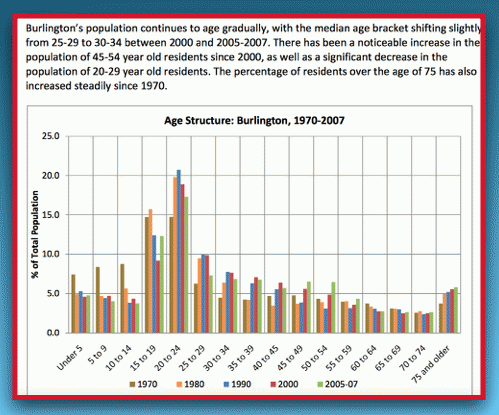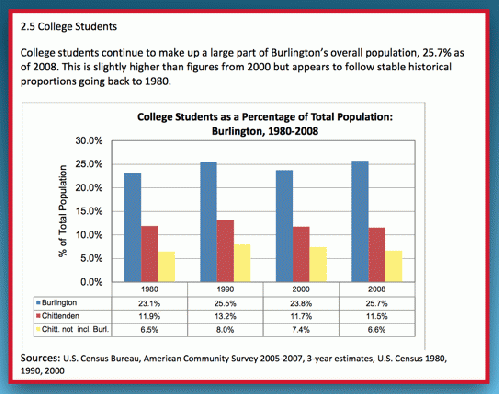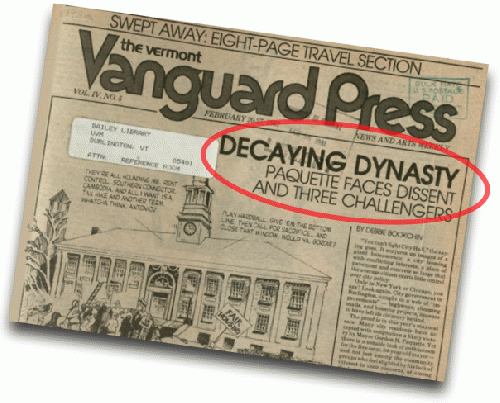
The U.S. Census accounting of Burlington's age structure from 1970 to 2007
(Image by U.S. Census, Public domain) Details DMCA
Downtown bars and businesses catered to the college students who made up 23.1% of the city's population. Burlington's close proximity to Montreal made it a restaurant and shopping mecca for Canadians in the summer. When the fall foliage colors were ablaze in autumn, tourists flocked to town. And, they shopped and ate, too.

College students represent a significant portion of the city
(Image by U.S. Census, Public domain) Details DMCA
The 1980 unemployment rate, at 5.5%, was slightly below the national average.*
Nevertheless, the city's government was becoming increasingly unpopular with many of Burlington's citizens. Under the leadership of five-term Democratic mayor, Gordon Pauquette, the city's economic agenda was focused on attracting and catering to the wealthy by building corporate office buildings, shopping malls, banking centers and other monuments to Pauquette's legacy. The side-effects to this vision included land speculation, increased housing costs, and efforts by Pauquette's administration to strong-arm a vociferously unwanted highway through working class neighborhoods on the south side of the city.
This approach to governance did not make the affected citizens happy.
Mayor Pauquette, sorely lacked a coherent or imaginative vision for the city as a whole. The city's administrators, fully in step with Pauquette's self-aggrandizing style of leadership, were largely unresponsive to the needs of the local neighborhoods and they lacked empathy for the poor and senior citizens. Other than demanding a huge property tax-hike to cover spiraling costs, they exhibited little interest in enhancing the economy for working class citizens, repairing infrastructure in working class neighborhoods, or controlling wasteful spending that was draining the city's coffers.
In 1981, Pauquette ran for a sixth term. He was so confident in the power of his grip on city hall that he was blind to the fact that his constituents were tiring of his governing priorities. Two of Pauquette's fellow Democrats had also had enough. Richard Bove and Thomas McGrath, defected from Pauquette's clique and jumped into the race against him in protest of his self-serving ambitions.

After a decade of Mayor Gordon Pauquette's leadership, the power structure in entrenched in Burlington's city government begins to show signs of collapse
(Image by Vanguard Press (February 20-27, 1981, Vol. IV, NO. 5)) Details DMCA
Then, Bernie Sanders, a self-described democratic-socialist without official governing experience, announced his run for mayor. Bernie had run in several statewide races as a third party candidate from the Liberty Union Party, but had been soundly beaten every time.
Bernie was blunt about Burlington's economic and social woes, and his plans for reviving its health. In his characteristic, no-nonsense way, he spoke passionately of the social and economic fabric of the neighborhoods, and for the needs of struggling families and small businesses. He knew that Burlington's future vitality lay in economically healing these groups of people, because when those at the bottom of the economic ladder are thriving, then the entire city thrives as well. As JFK famously put it, "a rising tide lifts all boats." Bernie Sanders' characterization of this essential truth was deeply inspirational to me.
I was in my mid-20's when I took a job at a small Burlington daycare center in 1980. My experiences there motivated me to pursue my Master's degree in Human Development and Family Studies at UVM.
This little daycare center served some of Burlington's most vulnerable citizens, including young single mothers and low income families. Many did not have proper healthcare or sufficient food, and their housing was grossly inadequate. Some of the children were sickly, their nutrition abysmal, and sometimes, their mothers couldn't afford fresh diapers, so the children stank.
These mothers were overwhelmed by working long hours at low paying jobs. Some were unable to meet their children's physical needs, let alone their emotional needs for comfort, security and connection. The spark of life that should brighten the eyes of every child was absent in many of these children. A well-known truth in the Human Development literature is that when a child's basic physical and emotional needs are not adequately met, then the future for this child is likely to be harsh and difficult.
Research affirms that grinding poverty inhibits healthy physical, mental, and emotional development in children. When parents are desperately grasping for survival, they have little, if any, energy left to cognitively and nutritionally enrich their children.
Next Page 1 | 2 | 3 | 4 | 5 | 6 | 7
(Note: You can view every article as one long page if you sign up as an Advocate Member, or higher).




